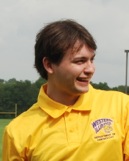Graduate Students
Shelby Assmus
Hometown: Fargo, North Dakota
Undergraduate: B.S. Exercise Science, North Dakota State
Rachel Bowden

Hometown: Bloomington, Illinois
Undergraduate: B.S. Exercise Science, Monmouth College
Dwayne Hagenow
Hometown: Kiel, Wisconsin
Undergraduate: B.S. Athletic Training, Western Illinois University
Ryan Krzyzkowski
Hometown: Franklin, Wisconsin
Undergraduate: B.S. Psychology, Lakeland College
Philip Nickols
Hometown: Two Rivers, WI
Undergraduate:B.S. AthleticTraining, UW-Oshkosh
Trevor Paulsen

Hometown: Bank of the Swanee, MS
Undergraduate: B.S. Exercise Science, Western Illinois University
Merri Schmidt
Hometown: Evansville, IN
Undergraduate: B.S. Athletic Training, University of Evansville
Danielle Thompson

Hometown: The Flatlands, IL
Undergraduate: B.S. Psychology, Central Michigan University
Marloes van Eijkelenburg
Hometown: The Hague, Netherlands
Undergraduate: B.S. Sport Management, Haagse Hogeschool Den Haag, NED
Track and field coaching style variations across NCAA competitive divisions
By exploring the training beliefs, protocols, theories, and methods used by track and field coaches, we can identify and better plan periodization strategies within the science of coaching to ultimately lead to peak performance in athletes. This study will be able to determine (a) if coaches coach the way the way they were taught/coached, (b) if coaches utilize research supported training methodologies, and/or (c) if coaches have developed their own training methods that could be further researched.
Endurance effects of concurrent strength and endurance training programming
The purpose of this study is to investigate the influence of pairing resistance training with endurance training in endurance athletes. I hypothesize that the resistance and endurance training group performance will be greater than the endurance training group.
The Changing Model of Athletic Training Graduate Assistantships
Graduate Athletic Trainers (GAATs) have been a viable option of healthcare for intercollegiate athletic programs for some time. GAAT carry the full responsibility of a full-time athletic trainer in the same position, with the only difference being salary and hours due to GAATs' academic responsibilities. In 2020 a mandate for a minimum of a Master’s degree to sit for the BOC exam begins, effectively eliminating the GAAT within the following 10 years. Colleges and universities need to explore alternative models of GAATs providing medical care of their athletes. A number of options to replace GAATs currently exist (e.g., assistant athletic trainers, internships, fellowships/residencies) yet little research has queried stakeholders about their interests and ideas. The purpose of this thesis is to assess stakeholder opinions on the most viable alternatives to GAATs following the implementation of the athletic training entry-level master's.
Understanding the athletic identity of student-athletes during the injury experience
With the increased interest and revenue in college sports, more focus has been given to understanding the psychological well-being of athletes. The majority of sport psychology research focuses on physically healthy athletes who can impact their team right away. There is a lack of understanding of the identity of an injured student-athlete. Re-injury anxiety and rehabilitation outcomes, all part of the injury experience, must be explored in alternative methodologies that expand the research and provide a richer understanding to this complex phenomena (Wadey, Evans, Hanton, & Neil, 2012a). Only a few studies focus on the psychosocial influence of participation (Geyh et al., 2012).The psychological well-being of student athletes may very well differ based on their health status.
Passport to Recovery: Helping Athletes Surmount Injury
Underreporting of concussions in college soccer players
With an increasing knowledge about concussions, and more importantly the risks associated with them, accurate recognition and management by players, coaches, and health care providers is critical. Since many symptoms of a concussion are subjective by nature, understanding the thoughts and actions of athletes at risk for these injuries can lead to better care and enhanced safety in sports. The purpose of this study is to investigate the phenomena of self-reported concussions in collegiate male soccer athletes.
Passport to Recovery: Helping Athletes Surmount Injury
Exploring the minds of senior triathletes: A qualitative study of training motivations
According to Grand’Maison (2004), triathlons attract people that are passionate, obsessed, focused, ambitious and sometimes compulsive. For any triathlete, it is difficult to sustain a high level of motivation (Grand’Mainson, 2004). Triathlons push the limits of human endurance and demands considerable amount of focus throughout the training process (Schofield, Dickson, Mummery, & Street, 2002). Although there have been studies on motivations of master triathletes, there is little research on the oldest of triathletes, the senior triathlete (ST). The purpose of the study is to better understand the motivations of senior triathletes to continue participating and training. By understanding their motivations to train for triathlons, one can apply the knowledge to the average aging population to help initiate and maintain physical activity.
Passport to Recovery: Helping Athletes Surmount Injury
Traveling the Yellow Brick Road: Career Transition Programming for Retiring Collegiate Student-Athletes
Passport to Recovery: Helping Athletes Surmount Injury
Traveling the Yellow Brick Road: Career Transition Programming for Retiring Collegiate Student-Athletes







Connect with us: